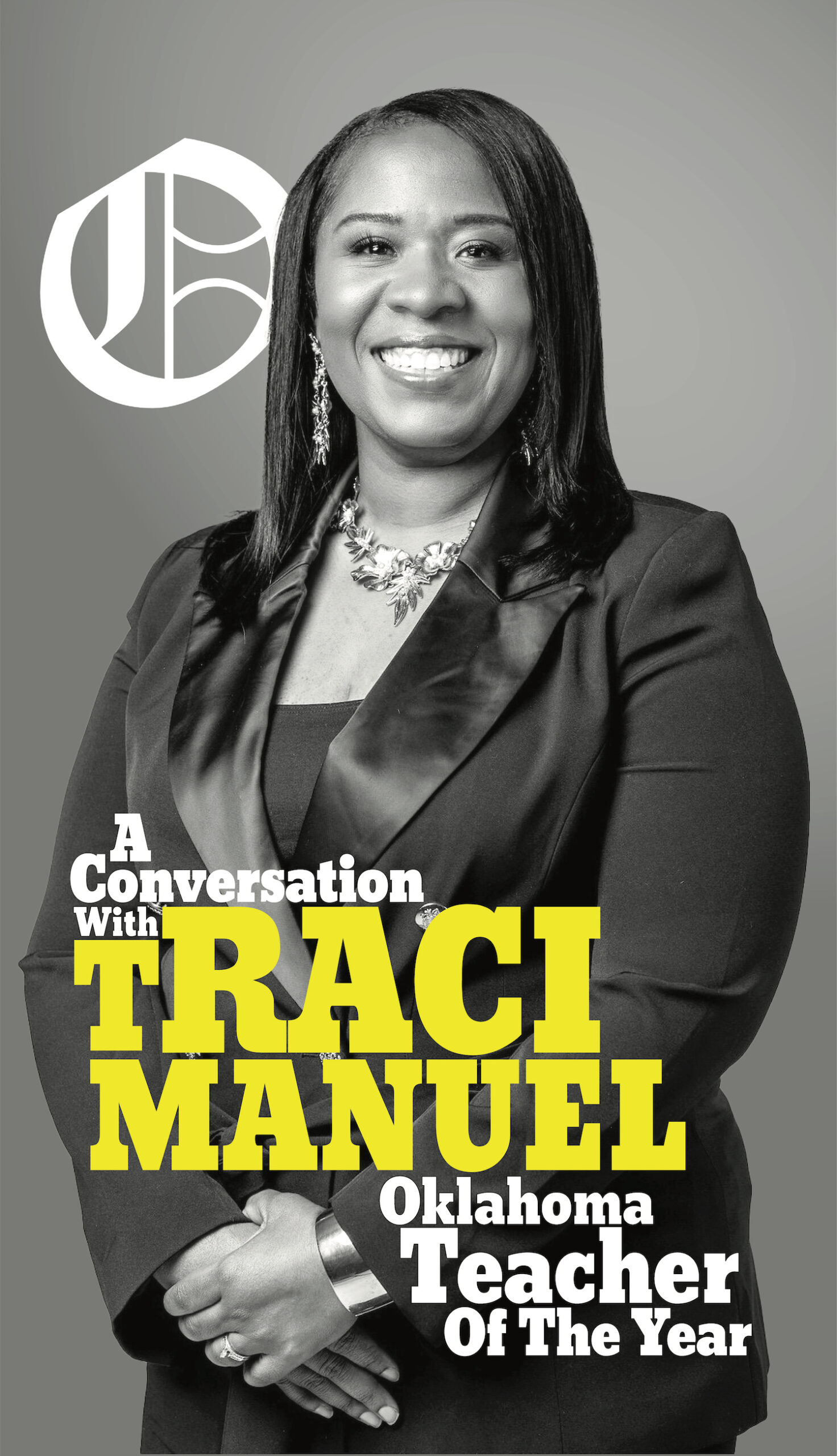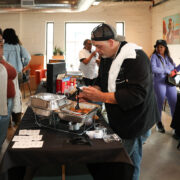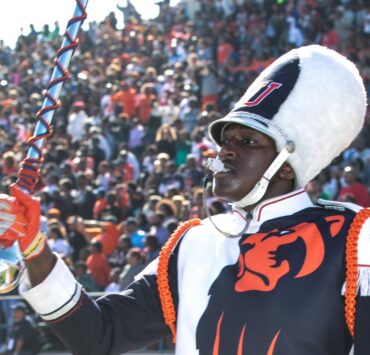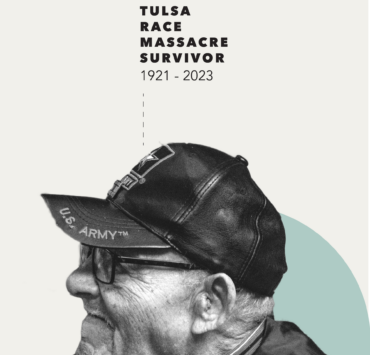
LOCAL & STATE
Gary Lee
The Oklahoma Eagle
Photo Facebook
There is no more thoughtful voice in the dialogue than Booker T. Washington English Teacher Traci Manuel. In recognition of her exemplary role leading her classrooms and educating students, Manuel was named Tulsa Teacher of the Year in 2022 and Oklahoma Teacher of the Year for the 2023- 24 school year. Manuel, a native Oklahoman, attended Tulsa public schools and is a 2000 graduate of Booker T. Washington High School. She joined TPS as a substitute teacher in 2005 and has taught at Carver Middle School and for the past two years has been on the faculty at Booker T. As Teacher of the Year, Manuel is traveling the state, promoting the causes of teachers and students. The Oklahoma Eagle engaged her for a wide-ranging interview. Our topics varied from Manuel’s challenges during her student days to her thoughts on how Oklahoma can better address the achievement gap between different sets of students. Manuel’s responses below were edited for clarity and conciseness.
Oklahoma Eagle: What was your toughest moment as a Tulsa Public School student?
Manuel: I had my challenges in school. I was working hard in some areas, struggling academically. When I had my senior meeting with my counselor at Booker T., she started shaking her head telling me “Traci, you don’t really have any good options.” I took that personally. When I left her office, there was an African American secretary at the time who overheard the conversation and saw my devastation. She said, “listen, young lady, you’re going to make it and we’re going to get you through this. You’re going to re-strategize. You need to come up with a plan of action. I ended up going to Philander Smith College and graduate school at the University of Michigan.
Oklahoma Eagle: How did your path lead you back to Tulsa and to teaching?
Manuel: In graduate school I worked with a gifted educator named Deborah Harman. Her big focus was on closing the achievement gap among students. Working with her, I was able to train superintendents, principals, teachers, on how to decrease the achievement gaps and become experts on cultural competency. I connected that work back to my hometown of Tulsa. I learned that in Tulsa the achievement gap was widening among students. My heart sank. I asked my husband if there was any way we could go back home and help some of those young kids. I wasn’t really wanting to do education. My goal was to open a performing arts center that helped kids with their talents. Back in Tulsa, I connected with Millard House (II), who was then principal at KIPP school, and he gave me the opportunity to work there. He said, “You go back into the classroom and stay there.” I responded, “Am I really ready for this?” I guess I was.
Oklahoma Eagle: What satisfies you most as a teacher?
Manuel: I have worked with a lot of students who were three and four, even more grade levels behind. I became very close with their families. I realized that this was my calling. This is where I needed to be – being able to see a lot of those students become successful finding their voices and overcoming their obstacles.
Oklahoma Eagle: Do you have a role model or mentor as a teacher?
Manuel: I’m inspired by Marva Collins, who was an innovator, an entrepreneur, and educator. She used to say, “we can reach children because they have so much potential. It’s up for us as teachers to tap into that and make it a reality for them.” So that’s me.
Oklahoma Eagle: What more can be done to close the achievement gap?
Manuel: The achievement gap is still growing in Tulsa. I – and many others – are working on it. Some people think that to close it you just jump into the curriculum and go forward. Well, there’s a lot more to it. … (In) our Black and brown communities, parents understood that they needed to provide more resources for their kids than what the public school system was able to offer. But we’ve always been at a disadvantage sometimes where we can’t afford those tools. So how are we as public educators dealing with that? We are using the tools that we have and having the conversations we need to have. At Booker T., for instance, the counselors might notice that students are not passing in reading, or their English classes. They try to approach the students and say, “Hey, can we have lunch and learn together?” Is TPS going about it the right way? I think so. In terms of (future) steps, they need to use experts in the classroom, and also turn to some of the retired educators.
In my journey as Teacher of the Year, I will be looking to help the state and to encourage certain districts to pursue getting experts in the classrooms and using everyday people in the classroom. Tulsa public schools are working to achieve that achievement gap. Are we there yet? Absolutely not. Can we do better? Yes,
Oklahoma Eagle: How does developing cultural competency among teachers fit in?
Manuel: For teachers to have cultural competency is crucial to helping close the achievement gap. We have to make sure our staff are trained and bring it back into the schools. But when we talk about activism, not every educator, either classroom teacher or administrator felt comfortable with those kinds of conversations. That’s where cultural competency comes in. I’ve realized that traditional educators look at the content, but don’t realize that not all content resonates with all our students. So, we have to ask, when they read something, how comfortable are they? Are the tests they take reflective of (the) students’ knowledge or students’ resources that they’ve been exposed to? Cultural competency calls for us to dig into that – to deal with the academic issues that students are facing. Because if students pick up a novel, or they are digging into their history, and they never see themselves, how vested are they going to be in their K through 12 (th grade) experiences? The communication styles of different teachers also matter. Let’s say a teacher decides to tell a student in a minority environment, would you like to open the text and let’s explore Booker T. or Mark Twain or whatever we’re looking at? And the student goes, “No, I really am not going to do that. I don’t want to do it.” And another teacher comes along who may relate to that student culturally and has a communication style of being direct and says, “Students open the text. Let’s dig in.” And the students do it. My approach as a teacher at Central High School was very different from my approach at Booker T. Washington. The way that I communicate as a teacher, the way that I relate, (and) the way that I interact with the students will vary according to the different demographics. But I think I got the same outcomes. So, you must be culturally competent about the students that you are addressing, especially when you are in lower performing environments, but also higher performing environments. I think you can’t not deal with cultural competency if you’re going to address the deficiencies that we have in public education.
Oklahoma Eagle: Are there some learning issues that linger from the Pandemic?
Manuel: Artificial intelligence – and how it is used among students – remains a big issue. As an English teacher, I could see that some of my students’ writings were not matching their conversations. When I asked some students to discuss topics, I saw that it didn’t match (the) papers they had done. I started thinking that plagiarism was an issue. And accountability was another one. Many students weren’t mastering skills. They were just churning out homework. We’re still dealing with that.
Another thing is that a lot of my Black and brown students are still a year or so behind their white counterparts. When we look at their writings, again, their critical thinking, their dedication and willingness to work through tough text, things of that nature, they may not have that same stamina to do some of those fields. They’re definitely still affected by this.
Oklahoma Eagle: You have a special needs child. Is TPS responding well to his learning needs?
Manuel: My son is 12, a fifth grader at Sequoia Elementary School. That’s one of our Title 1 schools. It has a high concentration of Hispanic students with a low number of white and African American community. My son had an interesting story. He is a special needs student. We knew we had to take very serious precautions to try not to fall behind during the COVID-19 period. And so, my aunt, an experienced educator for well over 40 years, worked with him one on one. He was also part of an academic disadvantage program. And we had some other people within our village – including my mother – who helped build his skills. So that’s how we are making sure he gets the best possible education. I know many kids did not have the advantages or resources he has.
Oklahoma Eagle: How can parents best be engaged with the learning experience?
Manuel: We need to give parents roles, responsibilities, and resources to help their children. I believe that they are very receptive to that. Obviously, …. magnet schools like Booker T. Washington, they don’t necessarily need that, because they still believe a lot of those parents that the parent is the first teacher that their child will interact with. And so, they show that in their involvement through the foundation, and they’re evolving through PTSA, and sports, and through other programs that their kids are in that they aren’t there. But many of our schools don’t have those resources. And so, I think if we began to in our community platforms, our churches, our organizations, our sports, because that’s where a lot of Black and brown students reside, we must begin to let parents know, we don’t just need to see you on the court. But we need to see you in the classroom and make those parents feel comfortable and (give) them the tools that they need to help their children be successful.
Oklahoma Eagle: How can the school system help kids who have fallen way behind in their grade level?
Manuel: It’s accurate on some levels that some of our kids are third and fourth grade levels. But it depends on the angle that you’re looking from. Many of my Anglo-Saxon kids, when it comes to English content, or the foundational skills — writing and reading, they have those. But my Black and brown kids, they have skill sets to engage in discussion (are) rich, and the ability to dig into text and connect it to real world applications. The tests do not show that we are performing strongly in those ways. The tests focus only on their written skills that matter. In my field as an educator, I know it’s not just my written expression that matters. It’s my oral expression as well. It’s with that perspective that we must take a second look at how well kids are doing.
One example is a kid named Michael. He was one of those kids who was very far behind in his skill sets. I remember Michael saying, “I can’t do it. And I don’t want to do it.” I responded, “Michael, you know what, I’m just going to call your mom. He said, “but do you even know my mom?” I slowly said, “Yeah, we’ve went to school together.” I knew we had not, but I used that as an approach to see how far I could get. To this day, Michael and I call ourselves family. He has grown by leaps and bounds and skill sets. He’s been able to make it and become successful. And there have been other such moments when I think through the stories of students and see their eye-opening moments. I see when they realize that I really care, I believe in them, I’m going to push them hard. Having those encounters with students really helped me know that this is what I’m supposed to be doing.
Oklahoma Eagle: What has been hardest for you as a classroom teacher?
Manuel: I had a rough road trying to figure out how do I find my voice. How do I continue knowing I’m in an environment where it’s not really inviting for me even as an adult? How do I push past these things, to make sure that these students and I have a respectful way of standing and that we’re grasping the things that they need? I still feel like I’m learning. I still have those moments when I ask myself “Do I belong?” But I think that I have gained the confidence to say it doesn’t matter if I belong, I am going to insert my voice and I am going to be respectful with that and respectful to you and we are going to journey alone together because that’s what we do with our magnet programs. So yeah, there have been points where I’ve been challenged and want to give up like other teachers, but again, through my village that I’ve always known, I can always go back to those retired educators and say, “Hey, what did you do when you had this? How did you handle this? How did you handle things when you and an administrator differed on ideas? How did you push through it? That’s how I’ve been able to really keep going.
Oklahoma Eagle: I know there is a shortage of schoolteachers in Tulsa and elsewhere in Oklahoma. What can we do to retain good teachers?
Manuel: I want to add my voice to the fight to keep teachers in Oklahoma. I know there are challenges in that fight — such as whether our pay rate may or may not increase. I want to make sure that there is the opportunity for systemic growth for teachers. Right now, on the table is whether or not to pay teachers by performance-based pay. At one time, teachers whose students had high test scores were being paid an extra stipend. But I look at teachers who are making growth changes, who may be in those low-performing schools with those students who are three- and four-grade levels behind. Those teachers who are in tough environments may even be working harder than teachers who are in environments where their kids are showing growth. So, when we look at performance-based pay, I think we really need to merge that with systemic growth. As long as teachers are showing growth, then we should be paying them for those efforts. That approach will make a better environment for our teachers, our students, our family and our standard state of Oklahoma for public good.
Oklahoma Eagle: You started a support group for girls and young women. What was the objective and how well did it work?
Manuel: I sponsored a group called Women of Power for years. This group dealt with the community, dealt with confidence, dealt with culture, career and college preparation for students. It was a leadership class. I keep in contact with those students. They learned to work through tough times and develop skills. Some other students that I didn’t have in that program haven’t fared as well.
Oklahoma Eagle: What inspires you?
Manuel: My faith, my family, my village, keep me going. I love to see a challenge. There’s not one challenge that I can’t say that I have not overcome. It may have taken me a while, but I’ve overcome it. Sometimes I feel like I’m in new territory with new tech challenges and so on. I need to stay engaged to help the next generation to overcome that.









